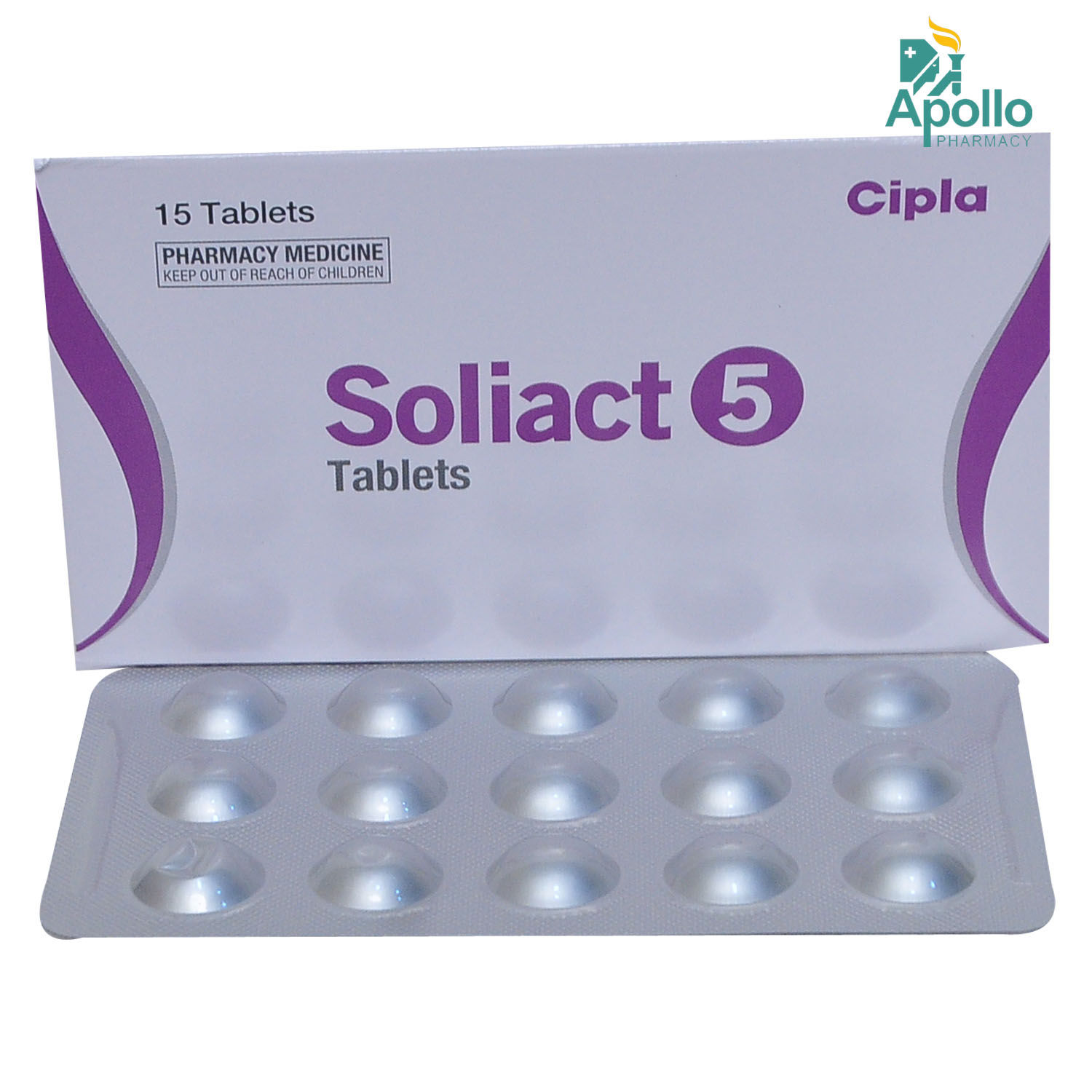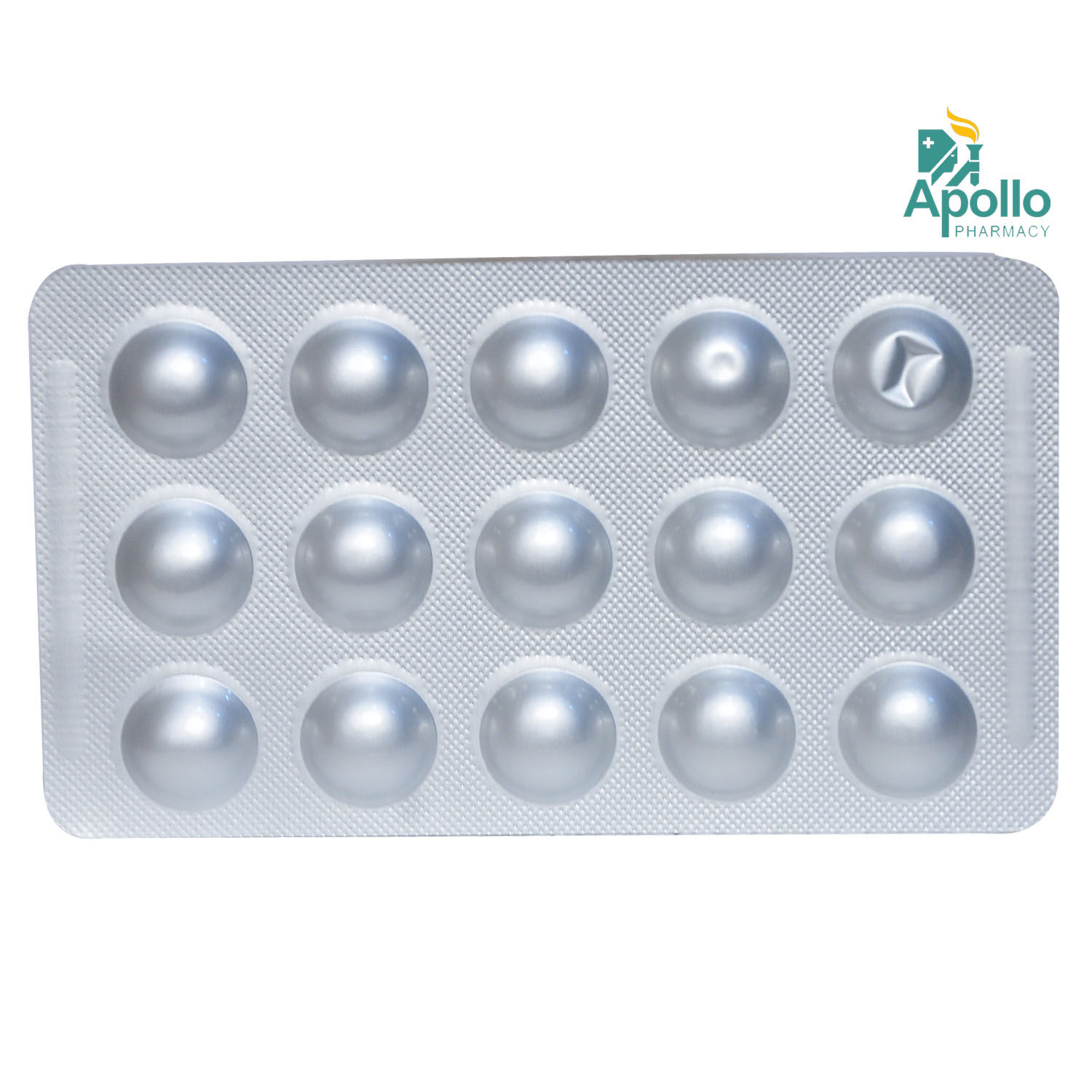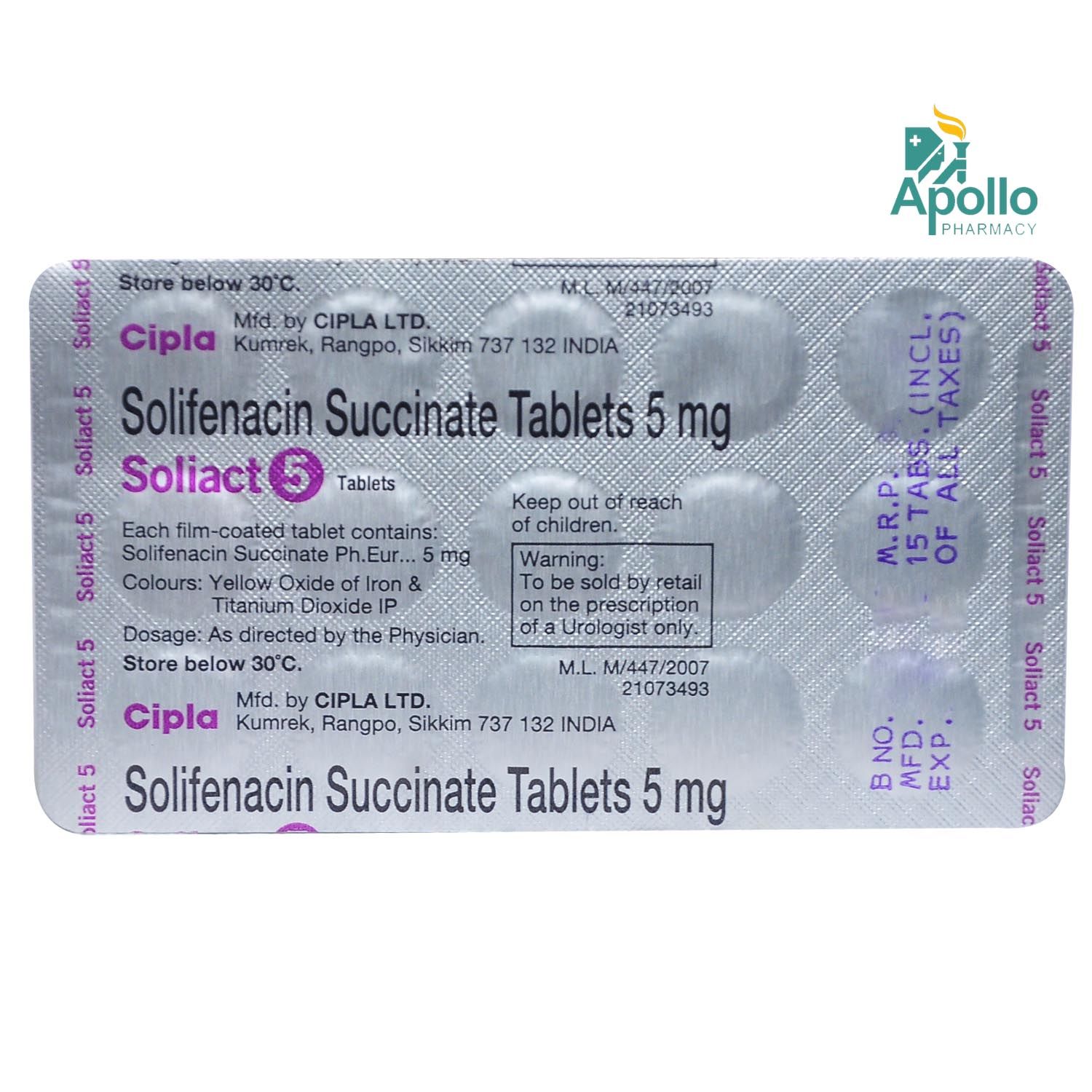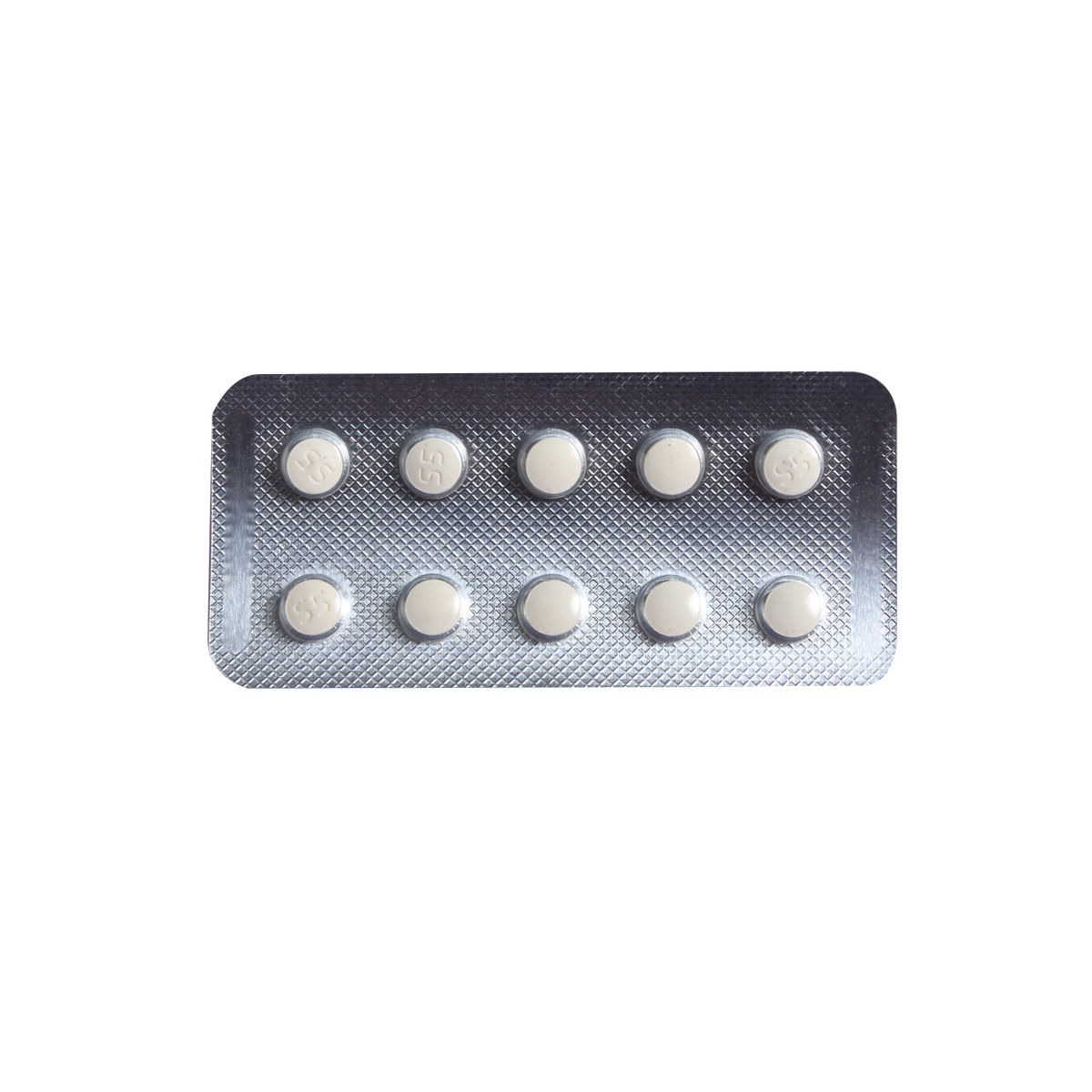Soliact 5 Tablet 15's





₹584.6*
MRP ₹649.5
10% off
₹552.07*
MRP ₹649.5
15% CB
₹97.43 cashback(15%)
Free Delivery
With Circle membership
(Inclusive of all Taxes)
This offer price is valid on orders above ₹800. Apply coupon PHARMA10/PHARMA18 (excluding restricted items)
Know Your Delivery Time
Provide Delivery Location
Available Offers
 Prescription drug
Prescription drugWhats That
 36 people bought
36 people bought 
Secure Payment

India's Most Trusted Pharmacy

Genuine Products
Composition :
Manufacturer/Marketer :
Consume Type :
Return Policy :
Expires on or after :
About Soliact 5 Tablet
Soliact 5 Tablet belongs to the group of medications called ‘urinary antagonists' or 'antispasmodics' primarily used in the treatment of overactive bladder (OAB) symptoms. Overactive bladder is a condition in which the urinary bladder muscles constrict uncontrollably, thereby causing an urgent need to urinate, frequent urination, and inability to control urination. Besides this, Soliact 5 Tablet is also used for the treatment of neurogenic detrusor overactivity (a bladder control condition caused by neurological problems) in children 2 years and above.
Soliact 5 Tablet contains ‘Solifenacin’ that relaxes the urinary bladder muscles, which in turn decreases the activity of the overactive bladder. In an overactive bladder, muscle contractions occur before the full expansion of the bladder, causing the patient to have frequent urges to urinate. Soliact 5 Tablet stops these sudden contractions of urinary bladder muscles, thereby enabling control over urination. Thus, it increases the amount and volume of urination that can be held by your bladder.
Take Soliact 5 Tablet as prescribed by the doctor. Common side effects of Soliact 5 Tablet are dry mouth, blurred vision, constipation, nausea, dyspepsia (indigestion), abdominal pain, burping or belching, heartburn, and stomach upset. Inform your doctor if these side effects do not go away or get worse.
Do not take Soliact 5 Tablet if you are allergic to ‘solifenacin’ or any other ingredients present in it. Before taking Soliact 5 Tablet , inform your doctor if you have kidney disease, liver disease, bladder blockage, myasthenia gravis (a muscle disease), stomach or bowel problems (including constipation), glaucoma (increased pressure in the eye causing loss of vision), or a history of heart rhythm problems (including QT prolongation). Also, inform your doctor if you are pregnant or breastfeeding. Inform your doctor if you have an intolerance to sugars, as this medicine contains lactose. Do not take grapefruit or grapefruit juice with this medication. Avoid driving or operating heavy machinery, as this medicine may cause dizziness.
Uses of Soliact 5 Tablet
Directions for Use
Medicinal Benefits
Soliact 5 Tablet contains ‘solifenacin’, which belongs to the class of medications called 'anticholinergics'. It can decrease the activity of the overactive bladder. In an overactive bladder, muscle contractions occur before the full expansion of the bladder, causing the patient to have frequent urges to urinate. Soliact 5 Tablet can stop these sudden contractions of bladder muscles. It enables control over urination and increases the amount of urine that can be held by your bladder.
How Soliact 5 Tablet Works
Storage
- Inform your doctor about dry mouth symptoms. They may adjust your medication regimen or prescribe additional medications to manage symptoms.
- Drink plenty of water throughout the day to help keep your mouth moist and alleviate dry mouth symptoms.
- Chew sugar-free gum or candies to increase saliva production and keep your mouth moisturized.
- Use saliva substitutes, such as mouthwashes or sprays, only if your doctor advises them to help moisturize your mouth and alleviate dry mouth symptoms.
- Avoid consuming smoking, alcohol, spicy or acidic foods, and other irritants that may aggravate dry mouth symptoms.
- Schedule regular dental check-ups to keep track of your oral health and handle any dry mouth issues as they arise.
- Inform your doctor about your constipation symptoms. They may adjust your medication or advise alternative treatments.
- Stay hydrated by drinking sufficient of water (at least 8-10 glasses a day) to help soften stool and promote bowel movements.
- Increase fibre intake by eating foods high in fibre, such as fruits, whole grains, vegetables and legumes, to help bulk up the stool.
- Establish a bowel routine by trying to go to the bathroom at the same time each day to train your bowels.
- Engaging in regular exercise, like walking or yoga, can support in bowel movement stimulation.
- Consult your doctor if constipation persists, and discuss alternative treatments or adjustments to your medication.
- Inform your doctor about the nausea and discuss possible alternatives to the medication or adjustments to the dosage.
- Divide your daily food intake into smaller, more frequent meals to reduce nausea.
- Opt for bland, easily digestible foods like crackers, toast, plain rice, bananas, and applesauce.
- Avoid certain foods that can trigger nausea, such as fatty, greasy, spicy, and smelly foods.
- Drink plenty of fluids, such as water, clear broth, or electrolyte-rich beverages like coconut water or sports drinks.
- Use ginger (tea, ale, or candies) to help relieve nausea.
- Get adequate rest and also avoid strenuous activities that can worsen nausea.
- Talk to your doctor about taking anti-nausea medication if your nausea is severe.
- Record when your nausea occurs, what triggers it, and what provides relief to help you identify patterns and manage your symptoms more effectively.
- You can take your medicine with meals to lower the chances of getting stomach pain.
- Avoid foods that are acidic, spicy, sugary, or greasy.
- Eat foods that are easily digestible such as rice, toast, and bananas.
- Eat your meals in smaller amounts throughout the day to prevent strain on your stomach and digestion.
- Drink water or fluids to stay hydrated and prevent stomach upset.
- Use a heating pad or massage your stomach area.
- Engage in mild physical activities such as yoga and walking.
- Preventing Vomiting (Before it Happens)
- Take medication exactly as prescribed by your doctor. This can help minimize side effects, including vomiting.
- Having a small meal before taking your medication can help reduce nausea and vomiting.
- Talk to your doctor about taking anti-nausea medication along with your prescribed medication.
- Managing Vomiting (If it Happens)
- Try taking ginger in the form of tea, ale, or candy to help alleviate nausea and vomiting.
- What to Do if Vomiting Persists
- Consult your doctor if vomiting continues or worsens, consult the doctor for guidance on adjusting your medication or additional treatment.
- Drink warm fluids such as warm water with honey, broth, soup or herbal tea to soothe sore throat.
- Gargle with warm salt water.
- Suck on lozenges to increase the production of saliva and soothe your throat.
- Use a humidifier to soothe sore throat as it adds moisture to the air and makes breathing easier.
- Tell your doctor about the cough symptoms you're experiencing, which may be triggered by your medication.
- Your doctor may adjust your treatment plan by changing your medication, adding new medications, or providing guidance on managing your cough symptoms.
- Practice good hygiene, including frequent handwashing, avoiding close contact with others, and avoiding sharing utensils or personal items.
- Stay hydrated by drinking plenty of fluids, such as water, tea, or soup, to help thin out mucus and soothe your throat.
- Get plenty of rest and engage in stress-reducing activities to help your body recover. If your cough persists or worsens, consult your doctor for further guidance.
What if I have taken an overdose of Soliact 5 Tablet
Drug Warnings
Do not take Soliact 5 Tablet if you are allergic to ‘solifenacin’ or any contents of it. Before taking Soliact 5 Tablet , inform your doctor if you are pregnant or breastfeeding or if you have kidney disease, liver disease, bladder blockage, controlled narrow-angle glaucoma, or stomach or bowel problems (including constipation), or a history of heart rhythm problems (including QT prolongation). Soliact 5 Tablet has lactose, so inform your doctor if you have an intolerance to any sugars. Soliact 5 Tablet may cause dizziness or blurred vision. So, do not drive or operate any heavy machinery. It can increase body temperature by decreasing sweating. So, avoid hot weather or doing strenuous exercise as this may cause overheating leading to unwanted effects.
Drug-Drug Interactions
Drug-Drug Interactions
Login/Sign Up
Taking Soliact 5 Tablet and Potassium chloride together can increase the risk of stomach ulcers, bleeding, and stomach injury.
How to manage the interaction:
Taking Soliact 5 Tablet with Potassium chloride is not recommended, as it can lead to an interaction, it can be taken if a doctor has prescribed it. However, if you experience severe stomach pain, bloating, sudden lightheadedness or dizziness, nausea, vomiting (especially with blood), decreased hunger, dark, tarry stools, consult the doctor immediately. Do not discontinue any medications without a doctor's advice.
Using Mesoridazine together with Soliact 5 Tablet can increase the risk of an irregular heart rhythm.
How to manage the interaction:
Taking Mesoridazine with Soliact 5 Tablet is not recommended, please consult your doctor before taking it. You should seek immediate medical attention if you develop sudden dizziness, lightheadedness, fainting, shortness of breath, or heart palpitations call a doctor.
The blood levels and effects of Soliact 5 Tablet may be greatly increased when combined with itraconazole.
How to manage the interaction:
Soliact 5 Tablet and Itraconazole may interact, however, if recommended by a physician, they are safe to consume. Consult a doctor if you feel sleepy, or uneasy, have an irregular heartbeat, have blurry vision, have trouble urinating, have a dry mouth, a headache, have digestive problems, or have constipation. Without consulting a doctor, never stop taking any medication.
Coadministration of Amiodarone with Soliact 5 Tablet can increase the risk of irregular heart rhythms.
How to manage the interaction:
Taking Amiodarone with Soliact 5 Tablet together can result in an interaction, it can be taken if your doctor has advised it. However, if you experience sudden dizziness, lightheadedness, fainting, shortness of breath, or rapid heartbeat, contact a doctor immediately. Do not discontinue any medications without consulting a doctor.
Coadministration of Citalopram with Soliact 5 Tablet can lead to or increase the risk of irregular heart rhythms.
How to manage the interaction:
Taking Citalopram with Soliact 5 Tablet together can result in an interaction, it can be taken if your doctor has advised it. However, if you experience sudden dizziness, lightheadedness, fainting, shortness of breath, or rapid heartbeat, contact your doctor immediately. Do not discontinue any medications without first consulting your doctor. Do not discontinue any medication without consulting a doctor.
Coadministration of Ivabradine with Soliact 5 Tablet can increase the risk or severity of irregular heart rhythms.
How to manage the interaction:
Taking Ivabradine with Soliact 5 Tablet together can result in an interaction, it can be taken if your doctor has advised it. However, contact a doctor immediately if you experience sudden dizziness, lightheadedness, fainting, shortness of breath, chest pain or tightness, rapid heartbeat, or memory loss. Do not discontinue any medications without consulting a doctor.
Co-administration of Soliact 5 Tablet with mifepristone can increase the risk of irregular heart rhythms.
How to manage the interaction:
Taking Soliact 5 Tablet with mifepristone together is avoided as it can result in an interaction, it can be taken if a doctor has advised it. However, contact a doctor immediately if you experience any symptoms such as dizziness, lightheadedness, fainting, shortness of breath, or irregular heartbeat. Do not discontinue any medications without consulting a doctor.
Coadministration of Ibutilide with Soliact 5 Tablet can lead to or increase the risk of irregular heart rhythms.
How to manage the interaction:
Taking Ibutilide with Soliact 5 Tablet together can result in an interaction, it can be taken if your doctor has advised it. However, if you experience sudden dizziness, lightheadedness, fainting, shortness of breath, or rapid heartbeat, contact your doctor immediately. Do not discontinue any medications without consulting a doctor.
Coadministration of Iloperidone with Soliact 5 Tablet can lead to or increase the risk of irregular heart rhythms.
How to manage the interaction:
Taking Iloperidone with Soliact 5 Tablet together can result in an interaction, it can be taken if your doctor has advised it. However, if you experience sudden dizziness, lightheadedness, fainting, shortness of breath, or rapid heartbeat, contact your doctor immediately. Do not discontinue any medications without first consulting your doctor.
Coadministration of Bedaquiline with Soliact 5 Tablet can increase the risk of an irregular heart rhythm.
How to manage the interaction:
Taking Bedaquiline with Soliact 5 Tablet together can result in an interaction, it can be taken if your doctor has advised it. However, if you experience sudden dizziness, lightheadedness, fainting, shortness of breath, or rapid heartbeat, contact your doctor immediately. Do not discontinue any medications without first consulting your doctor.
Drug-Food Interactions
Drug-Food Interactions
Login/Sign Up
Diet & Lifestyle Advise
Eat fresh fruits like pears, banana, citrus fruits, and green vegetables like beans and potatoes.
Try to take cranberry juice as it helps in minimizing urinary infections.
Avoid coffee, tea, and carbonated drinks which contains caffeine.
Do not consume processed, fried, or spicy foods, as these foods can irritate your bladder.
Limit alcohol intake as it can increase the risk of side-effects.
Quit smoking and exercise regularly.
Habit Forming
Therapeutic Class
Soliact 5 Tablet Substitute

Soliten 5 mg Tablet 10's
by Others
₹35.91per tabletSolicept 5 Tablet 15's
by Others
₹46.62per tabletBispec 5 Tablet 15's
by Others
₹46.71per tabletFloslo 5 Tablet 10's
by Others
₹32.85per tabletSolibite ODG 5 mg Granules Stick Pack 1's
by Others
₹44.10per tablet
Product Substitutes
Alcohol
Caution
Avoid taking alcohol as it increases the risk of side-effects.
Pregnancy
Unsafe
Soliact 5 Tablet is a category C medicine. It should be used in pregnant women if the benefits outweigh the risks.
Breast Feeding
Caution
Soliact 5 Tablet should be used in breastfeeding mothers only if clinically needed.
Driving
Caution
Soliact 5 Tablet may cause dizziness and blurred vision. So, avoid driving or operating heavy machinery after using Soliact 5 Tablet .
Liver
Caution
Soliact 5 Tablet should be used with caution in patients with liver diseases. Dose adjustments may be necessary.
Kidney
Caution
Soliact 5 Tablet should be used with caution in patients with kidney diseases. Dose adjustments may be necessary.
Children
Caution
Soliact 5 Tablet should not be used in children below 12 years of age unless prescribed by a doctor.

Have a query?
FAQs
Soliact 5 Tablet is primarily used in the treatment of overactive bladder (OAB) symptoms. Besides this, Soliact 5 Tablet is also used for the treatment of neurogenic detrusor overactivity (a bladder control condition caused by neurological problems) in children 2 years and above.
Soliact 5 Tablet is used to treat an overactive bladder in which an individual is unable to control urination and always have a strong urge to urinate. Soliact 5 Tablet prevents these sudden bladder muscle contractions and increasing the volume and amount of urine that the bladder can hold. Thus, Soliact 5 Tablet helps to control the release of urine and helps reduce symptoms of OAB like a strong urge to urinate, frequent urination and reduced urine flow.
Soliact 5 Tablet may cause blurred vision in some cases. Consult your doctor immediately if this condition persists or worsens while using this medicine.
Ketoconazole is an antifungal medicine and it may interact with Soliact 5 Tablet . So, inform your doctor about all the prescription and non-prescription medicines before taking Soliact 5 Tablet to avoid unwanted effects.
Dry mouth, constipation, urinary tract infection and blurred vision are some of the common side effects of Soliact 5 Tablet .
If you have bladder problems, stomach problems, narrow-angle glaucoma, liver/kidney problems and irregular heartbeat, please contact a doctor before taking Soliact 5 Tablet .
Dry mouth is the most common side effects of Soliact 5 Tablet , so you can drink plenty of fluids or water, suck hard candy or ice chips, chew (sugarless) gum, or use a saliva substitute. However, if you are a kidney patient before taking any fluid or electrolytes, it is better to consult a doctor.
If you are taking antidiabetic medicines (pramlintide), potassium tablets and antifungals (like itraconazole, ketoconazole), among others, let your doctor know about these drugs before using Soliact 5 Tablet . These medicines may affect the working of Soliact 5 Tablet and slow its excretion from the body.
Overactive bladder is a condition in which the urinary bladder muscles constrict uncontrollably, thereby causing an urgent need to urinate, frequent urination, and inability to control urination.
Soliact 5 Tablet starts to work within 3 to 8 hours, but it can take up to 4 to 6 weeks to work fully.
Take Soliact 5 Tablet at around the same time(s) every day. Follow the directions on your prescription label or as directed by the physician.
Soliact 5 Tablet is a safe and effective medication if prescribed by a doctor. However, it is not suitable for everyone, especially those with specific underlying conditions. Please discuss with your doctor whether it is appropriate.
A marked increased risk of dementia was associated with the use of Soliact 5 Tablet . Please seek medical attention if you have experienced any symptoms or if they persist.
Soliact 5 Tablet does not affect any type of contraception.
This medication is normally taken on a long-term basis to help regulate your symptoms. Your doctor will check in every 6 to 12 months to evaluate if you should continue taking it.
If you have urinary incontinence, it can help to cut down on alcohol and drinks containing caffeine, such as coffee, tea, cola and energy drinks.
Soliact 5 Tablet should not make you lose or gain weight. However, very rarely Soliact 5 Tablet can make you feel less hungry, so you may lose weight.
Do not take solifenacin for longer than is necessary. Every 6 to 12 months, your doctor will determine whether your treatment is still required. In older adults taking solifenacin, there may be an increased chance of confusion and dementia worsening. If you're concerned, talk to your doctor.
Talk to your doctor if you're thinking about stopping your medicine. Do not stop taking solifenacin without talking to your doctor first. If you've been taking it for at least six months, your doctor may suggest that you stop for up to 4 weeks to see how your symptoms change without it. Some people find that their symptoms are still better after they've stopped taking it.
Country of origin
Manufacturer/Marketer address
Customers Also Bought
Disclaimer
Author Details
We provide you with authentic, trustworthy and relevant information




























